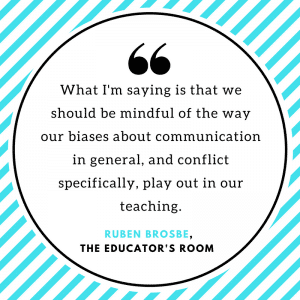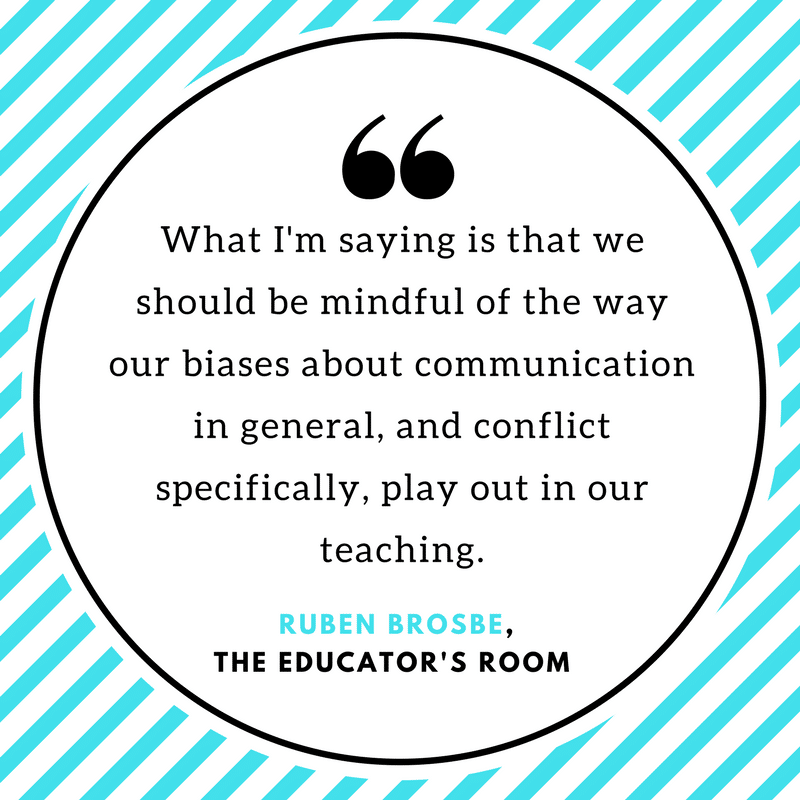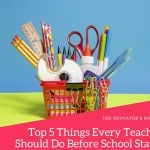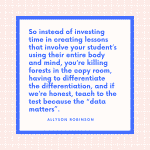I’m in my eighth year of teaching, and I’m still constantly realizing new things about teaching. Most recently, I realized that I was afraid of conflict in my classroom.
Since I started teaching, it’s been drilled into my head that the first and foremost marker of a successful teacher is strong classroom management. Classroom management can look and sound very different from school to school, and teacher to teacher. Depending on the expectations of your administrator and your school’s culture, effective classroom management might look like all kids sitting in an upright fixed position in a silent room or it might look like kids sprawled out in various positions and engaged in conversations.
Personally, I’ve gotten more and more uncomfortable with the language of classroom management, and I’ve tried to ditch it altogether. But even if I’ve tried to ditch some of the languages of classroom management, I haven’t gotten rid of a mindset that prioritizes classroom management as #1.
[bctt tweet=”Learning can only occur when students feel physically and psychologically safe” username=”EducatorsRoom”]
And to a certain extent, this makes sense. Learning can only occur when students feel physically and psychologically safe. But at the same time, I made the mistake of equating safety with an absolute lack of conflict. This meant that if kids fought or were occasionally unkind to one another, I took it as a personal failure. When kids would get into arguments or called each other names I saw it as a problem in my classroom management. And if there’s a problem in my classroom management, how could I possibly be an effective teacher?
It was only after reflecting on my own aversion to conflict that I realized how unfair and unrealistic I was being. As teachers, we bring our own preferences and biases into the classroom with us every day. Sometimes this is harmless, like when we prefer kids to write their heading at the top of the page a certain way. Other times, our biases can be damaging – to our students and ourselves – especially if they go unseen and unexamined.
As long as I can remember, I’ve generally avoided being blunt about my preferences and feelings. Avoiding conflict myself has led me to try to eliminate conflict in my classroom. However, this aversion to conflict isn’t just a personal preference or a byproduct of my upbringing. It’s a feature of white culture. Read this excerpt from Dismantling Racism: A Workbook for Social Change Groups, by Kenneth Jones and Tema Okun, and tell me if it sounds familiar.
Fear of Open Conflict
-
people in power are scared of conflict and try to ignore it or run from it
-
when someone raises an issue that causes discomfort, the response is to blame the person for raising the issue rather than to look at the issue which is actually causing the problem
-
emphasis on being polite
-
equating the raising of difficult issues with being impolite, rude, or out of line
When I recognized that conflict aversion is a feature of whiteness, it shifted my whole thinking. It made me see that enforcing a conflict-free classroom wasn’t just unrealistic and unfair to me. In enforcing a conflict-free classroom (or trying to) with a room of 25 Black and brown kids I was also upholding white supremacy.
Let me be clear. I am not saying that white teachers are wrong to uphold standards of respect and kindness in their classroom. What I’m saying is that we should be mindful of the way our biases about communication in general, and conflict specifically, play out in our teaching. Our white-centric views of communication can have harmful consequences.
[bctt tweet=”We should be mindful of the way our biases about communication in general, and conflict specifically, play out in our teaching.” username=”EducatorsRoom”]
One example is tone policing, or the act of dismissing someone’s argument because of the tone they use to make it. This occurs frequently in conversations about racism. However, it can also happen in a more broad sense when white teachers try to manage the way Black and brown students express themselves. This can have a serious impact when a white teacher’s bias leads them to label a student “defiant,” “disrespectful,” or “challenging.” This bias occurs as soon as kids of color enter pre-school, and results in higher rates of suspensions and expulsions.
Thus, trying to remove conflict from my classroom isn’t just a personality issue, it’s a social justice issue. As I try to find ways to communicate more directly and honestly, even if it means creating conflict, I am thinking about how to cultivate this same culture in my classroom. It begins by practicing healthy conflict myself. When my colleagues and I are discussing a unit plan or a field trip, and I disagree with the direction we’re discussing, I need to say so. Or if another co-worker is talking disparagingly about a student’s family, I need to speak up.
Inside my classroom, I can provide more opportunities to role play and practice healthy conflict. When kids get angry or upset with one another, I want to provide a safe outlet for those emotions, rather than stifling them. I want kids in my classroom to understand that conflict is normal and healthy, and there are ways to disagree without name calling or holding grudges.
Keeping this in mind, I’m trying not to hold myself to a standard of a conflict free classroom anymore. It may be tricky at first, but it’s necessary. Kids may be smaller human beings, but they’re human beings, and human beings fight! And sometimes human beings say things that aren’t nice. That may not be my favorite part of teaching, but it’s a real one. When I acknowledge that I’m fairer to myself and to my students.






